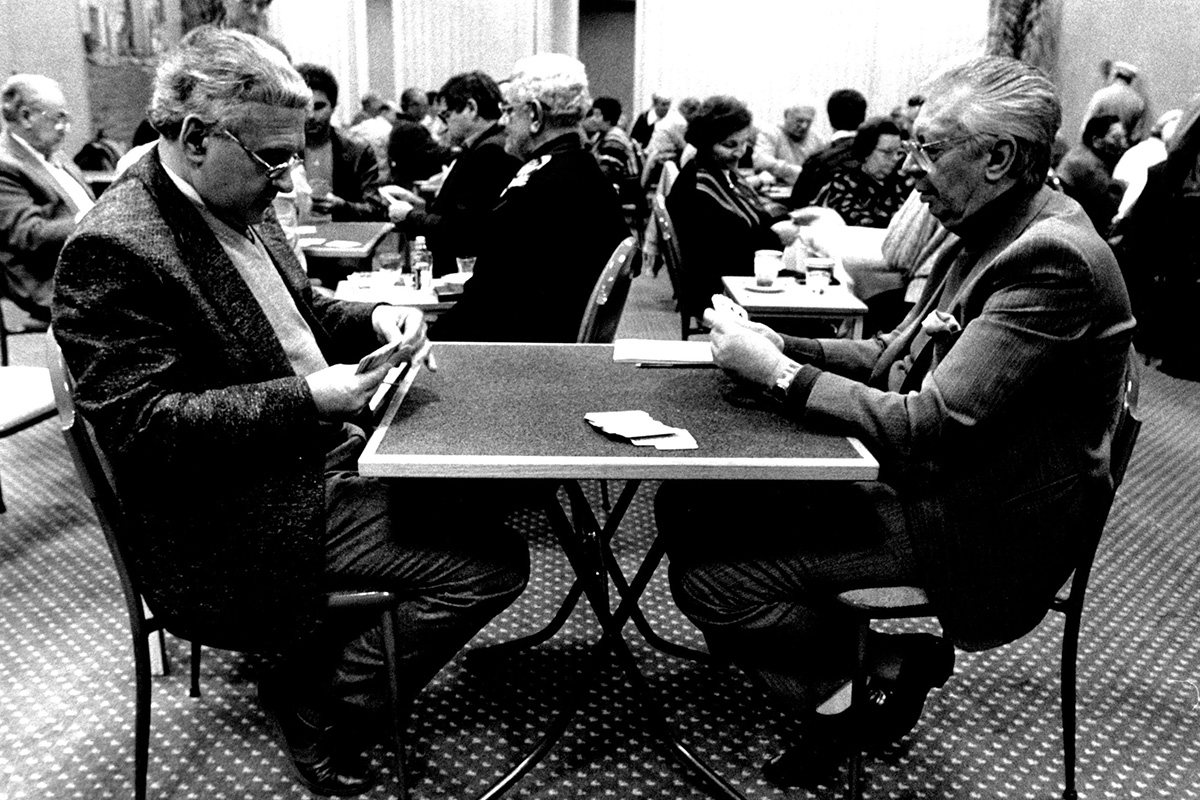Jewish youth can’t get enough of our grandparents. We’re all just, well, obsessed with saftas and sabas. Everything from challah and statement brooches to charismatic figures remind us of our grandparents — who can forget when Bernie Sanders became Zayde Bernie? While not a uniquely Jewish attitude, we esteem Jewish grandparents as cornerstones of our people’s continuity. In many cases, they are. So how do those of us who are Jewish-grandparent-less fit into all of that?
My Jewish grandmother and grandfather passed away when I was 2 and 11 years old, respectively, before I could establish a personal interest in Judaism. Ever since, I’ve reminded myself that there is no single mold for a Jewish family, but there’s no avoiding the sporadic reminders that grandparents are missing from the Shabbat table.
Judaism doesn’t strictly occur within synagogues or Jewish organizations. It takes place in rituals — during the lighting of Shabbat candles, participating in charity initiatives or dressing up for Purim. Parents and grandparents are often pivotal in cultivating these environments. Even the Talmud suggests that grandparents are responsible for teaching Torah. Given that intergenerational culture sharing is central to the Jewish ethos, it’s only natural that grandparents play a part in this.
However, this isn’t the case for everyone. Many of us have had to fashion a vision of our grandparents from stories alone. The earliest one I have of my own grandparents took place in 1962, when their first date occurred at Cafe 21, one of Sydney’s most authentic Hungarian restaurants, boasting a menu guaranteed to make any Ashkenazi heart sing: matzah ball soup, chopped liver and schnitzels of all shapes and sizes.
I’m told my grandparents were not nearly as engrossed in this renowned spread, however, as they were in their conversation. Rumor has it that they remained into the early hours of the morning until my Pa eventually dropped my grandmother Ohne (pronounced oh-knee, because a toothless 2-year-old me had difficulty pronouncing Leone, which stuck…) home. Months later, they were married.
I know they led a life grounded in Jewish practice. Each time they moved cities, locating a new synagogue to frequent was a high priority. They were loyal patrons of Bondi’s Hakoah Club, founded in 1939 by Jewish migrants that over decades became a social headquarters for Sydney’s Jewish community. After my grandfather passed away, however, my parents and I stopped attending such Jewish venues, a trend towards secular life that became more pronounced as time passed.
This is not to say that I’ve been raised with no connection to Judaism at all; it has just meant that the Jewish elders stereotypically charged with spearheading Shabbats and holiday celebrations haven’t been around to do it. So, on many occasions, plans have gone unmade, holidays uncelebrated and recipes unshared. I often hear about how my grandmother’s matzah kugel stole the Passover show each year, and when I do, it makes me ache for the lessons and experiences we were never able to share.
For too long, however, I channeled my desire for their guidance into resentment (and, seemingly, a hunger for kugel). I watched others take their grandparents for granted, dismissing them as overbearing. I rolled my eyes when friends reminded me how much “Shiva Baby” resembled their own family get-togethers filled with old Jews. I imagined myself amidst scenes of manic Jewish events where relatives congregated at the periphery of a bagel-adorned table. There was even something endearing about the sound of being pried about your love life or having a stray, protruding bone worriedly poked by an elder.
But my grandparents were forward thinking people. On the day of my bat mitzvah, held two years after my grandfather’s passing, a crowd of older individuals lined the sanctuary’s back row. They’d been invited by my parents, who in my opinion had cast a web of invitations over anyone they’d ever encountered. (Seriously, they even resorted to Google detective work to ensure no one’s family members had been forgotten.) Personally? I couldn’t tell Frank from Ruth, and it was likely to stay that way. Yet as the group of who I now know to be my grandfather’s friends descended upon me post-ceremony, I felt a wave of guilt. They were kind enough to come bearing a gift — a circular white box drowning in a disproportionately large black bow. In what was likely expressed via teenage murmur, I thanked them all. But the gift was actually from my grandfather. Anticipating death, he had tucked away a charm bracelet for me to open on this special occasion. As it turns out, it was years in the making. Each charm had been collected from a different destination along his retirement travels for me to eventually don on my wrist. So, yep, it doesn’t get much more forward thinking than that.
During lockdown this year, the absence of family struck most deeply. In reflecting, I’ve realized that I, too, must be forward thinking. Although my head currently only houses about five grey hairs, it won’t stay this way forever. I know I’ll find myself needing to be the grandparent I’ve yearned for the physical presence of all these years. So this year I looked up Rosh Hashanah recipes and forced my non-Jewish housemates to get in on the fun of dunking apples in honey. I turned to YouTube for a round challah tutorial. And soon, I plan to host my first Hanukkah. All the while, I’ve been encouraged by the thought of the naches (pride) it would bring my grandparents to watch me.
This is the best advice I could offer to anyone in the same position: Carving your own Jewish identity is empowering. And as you do, you might feel the presence of your ancestors. Or you may not. But you’ll certainly feel connected to traditions and peoplehood, which is a truly remarkable thing.
In loving memory of Pa and Ohne.



